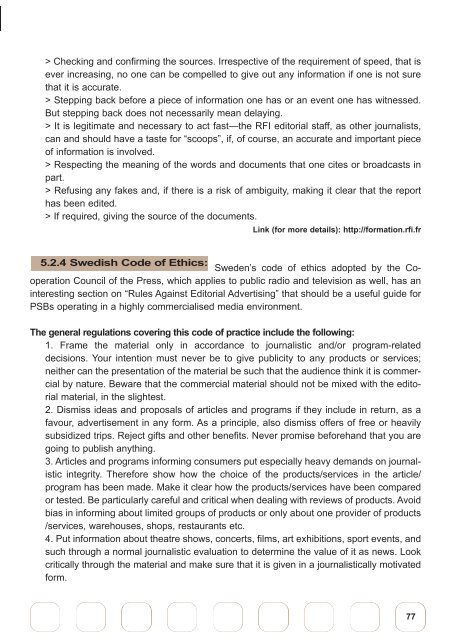Public service broadcasting: a best practices ... - unesdoc - Unesco
Public service broadcasting: a best practices ... - unesdoc - Unesco
Public service broadcasting: a best practices ... - unesdoc - Unesco
Create successful ePaper yourself
Turn your PDF publications into a flip-book with our unique Google optimized e-Paper software.
Checking and confirming the sources. Irrespective of the requirement of speed, that is<br />
ever increasing, no one can be compelled to give out any information if one is not sure<br />
that it is accurate.<br />
> Stepping back before a piece of information one has or an event one has witnessed.<br />
But stepping back does not necessarily mean delaying.<br />
> It is legitimate and necessary to act fast—the RFI editorial staff, as other journalists,<br />
can and should have a taste for “scoops”, if, of course, an accurate and important piece<br />
of information is involved.<br />
> Respecting the meaning of the words and documents that one cites or broadcasts in<br />
part.<br />
> Refusing any fakes and, if there is a risk of ambiguity, making it clear that the report<br />
has been edited.<br />
> If required, giving the source of the documents.<br />
Link (for more details): http://formation.rfi.fr<br />
5.2.4 Swedish Code of Ethics:<br />
Sweden’s code of ethics adopted by the Cooperation<br />
Council of the Press, which applies to public radio and television as well, has an<br />
interesting section on “Rules Against Editorial Advertising” that should be a useful guide for<br />
PSBs operating in a highly commercialised media environment.<br />
The general regulations covering this code of practice include the following:<br />
1. Frame the material only in accordance to journalistic and/or program-related<br />
decisions. Your intention must never be to give publicity to any products or <strong>service</strong>s;<br />
neither can the presentation of the material be such that the audience think it is commercial<br />
by nature. Beware that the commercial material should not be mixed with the editorial<br />
material, in the slightest.<br />
2. Dismiss ideas and proposals of articles and programs if they include in return, as a<br />
favour, advertisement in any form. As a principle, also dismiss offers of free or heavily<br />
subsidized trips. Reject gifts and other benefits. Never promise beforehand that you are<br />
going to publish anything.<br />
3. Articles and programs informing consumers put especially heavy demands on journalistic<br />
integrity. Therefore show how the choice of the products/<strong>service</strong>s in the article/<br />
program has been made. Make it clear how the products/<strong>service</strong>s have been compared<br />
or tested. Be particularly careful and critical when dealing with reviews of products. Avoid<br />
bias in informing about limited groups of products or only about one provider of products<br />
/<strong>service</strong>s, warehouses, shops, restaurants etc.<br />
4. Put information about theatre shows, concerts, films, art exhibitions, sport events, and<br />
such through a normal journalistic evaluation to determine the value of it as news. Look<br />
critically through the material and make sure that it is given in a journalistically motivated<br />
form.<br />
77


